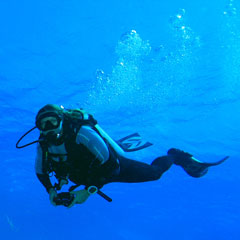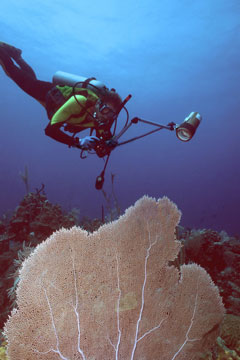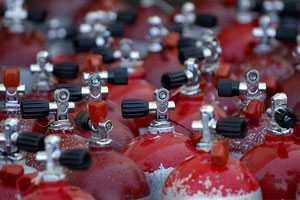
Scuba Diving
Sports Information Menu |
|---|
| Archery • Baseball • Basketball • Bowling • Cycling |
| Football • Golf • Hockey • Lacrosse • Paintball |
| Racquetball • Rock Climbing • Scuba Diving |
| Skateboarding • Skating • Skiing • Soccer |
| Softball • Squash • Surfing • Tennis • Volleyball |
 Scuba diving is a popular sport worldwide and involves entering a body of
water and remaining below the surface. The word "scuba" is an
acronym for "Self-Contained Underwater Breathing Apparatus." Divers
carry an air tank which allows them to breathe while submerged.
Scuba diving most commonly takes place in the ocean, but divers can also
participate in certain lakes, rivers, and ponds. Snorkeling is a
shallower form of dive sport, taking place on the surface or just below.
Scuba diving is a popular sport worldwide and involves entering a body of
water and remaining below the surface. The word "scuba" is an
acronym for "Self-Contained Underwater Breathing Apparatus." Divers
carry an air tank which allows them to breathe while submerged.
Scuba diving most commonly takes place in the ocean, but divers can also
participate in certain lakes, rivers, and ponds. Snorkeling is a
shallower form of dive sport, taking place on the surface or just below.
Recent Scuba Diving News
- Brit, 59, dies while scuba diving off beach on Spanish holiday island
The 59-year-old was assisted by emergency medical responders after getting into difficulties at a small sandy cove called Playa Chica in the tourist resort of Puerto del Carmen
Daily Mail. Friday, 30 Aug 2024 15:30:42 +0100. - British woman missing in Thailand
The UK Foreign Office is supporting the family of a British woman after a scuba diving tour boat reportedly capsized off the coast of Thailand.
Sky News. Monday, 25 Dec 2023 04:19:00 +0000. - Visit this scuba diving news page for more extensive news coverage.
There are approximately 6 million scuba divers around the world engaging in various diving pursuits such as wreck, cave, commercial, and military. Sport, or recreational diving, is the most common form and is practiced at depths of less than 130 feet. Advanced training is required to dive beyond these parameters.
 Depending on the location and type of diving, divers may be able to enter
the water from shore, or they may need to dive from a boat. One or
more people remain onshore or in the boat as a spotter for the
group. They must fly a red flag with a white diagonal strip to
alert nearby boats when divers are underwater.
Depending on the location and type of diving, divers may be able to enter
the water from shore, or they may need to dive from a boat. One or
more people remain onshore or in the boat as a spotter for the
group. They must fly a red flag with a white diagonal strip to
alert nearby boats when divers are underwater.
During descent, water pressure increases, causing ear and sinus discomfort, which divers relieve by holding their nose and gently blowing, a technique called equalization. A diver will use more oxygen on a deeper descent, so it follows that shallow dives can last longer. In addition to the depth of the diver, several other factors contribute to rate of oxygen consumption, including experience, relaxation level, and physical fitness.
Scuba enthusiasts must become certified through a scuba diving agency. Well-known agencies include PADI and the National Association of Underwater Instructors (NAUI). Participants must be confident swimmers, in good health, and at least 12 years old. The courses teach use of diving equipment, pressure equalization, efficient swimming underwater, and safe ascension through class work, pool practice, and open water dives.
 Recreational divers use fins, a mask, and an air tank and regulator, as
well as a buoyancy compensator and weight system (to remain neutrally
buoyant). They also need depth and pressure gauges, a wetsuit, and an alternate air
source. A lead-weighted belt helps divers descend and stay
underwater. Scuba divers may also carry a dive knife to untangle
themselves from marine plants, as well as whistles, lights, and signaling
devices in case of an emergency.
Recreational divers use fins, a mask, and an air tank and regulator, as
well as a buoyancy compensator and weight system (to remain neutrally
buoyant). They also need depth and pressure gauges, a wetsuit, and an alternate air
source. A lead-weighted belt helps divers descend and stay
underwater. Scuba divers may also carry a dive knife to untangle
themselves from marine plants, as well as whistles, lights, and signaling
devices in case of an emergency.
Unless scuba divers ascend at a steady rate, they risk decompression sickness, also known as the bends. This occurs because the body absorbs nitrogen which forms tiny bubbles in the bloodstream which remain trapped in the body if the diver ascends too quickly. This can cause extreme pain in joints and organs, and can be fatal in severe cases. Decompression sickness can be avoided by gradual ascension and calculation of how long to stay at certain depths. Divers must also wait 12 or 24 hours before flying on a plane due to rapid changes in air pressure.
Many recreational divers like warm clear locations with plentiful coral. For this reason, the Caribbean is the most popular scuba destination in the world. Other popular locations are the South Pacific, Indian Ocean, and Red Sea.
Scuba Diving Information Resource
All rights reserved. About Us.